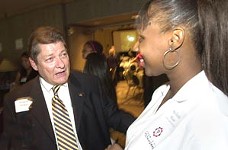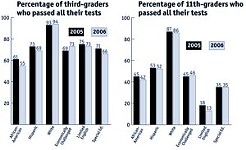Girls, Uninterrupted
An interview with Rachel Simmons
By Rachel Proctor May, Fri., Jan. 23, 2004

Ah, those idyllic girlhood days. Who doesn't harbor fond memories of slumber parties, soccer matches, and leaving nasty notes in the unpopular girl's locker? Author Rachel Simmons' 2002 bestseller Odd Girl Out: The Hidden Culture of Aggression in Girls documented the myriad ways the fairer sex behaves dreadfully toward each other. In December, she followed it up with Odd Girl Speaks Out: Girls Write About Bullies, Cliques, Popularity, and Jealousy. As the title suggests, the book gave real girls a chance to sound off about their own experiences. As a guest of GENaustin, a nonprofit that focuses on girls' empowerment issues, Simmons will speak tonight, Thursday, about her findings with a panel of highly qualified experts -- local girls -- and discuss how girls and the adults in their lives can address female bullying.
Austin Chronicle: What inspired Odd Girl Speaks Out?
Rachel Simmons: While I wanted Odd Girl Out to be readable, it was marketed to parents and simply wasn't accessible for many girls. So, it was important to me that this book would be something all girls could read. Also, from the letters I received, I realized there was a real longing for advice. Not only did girls say, "Here's this story in my own voice," but also, "Please tell me what can I do about it." It reminded me that there's very little practical information available to girls on how to deal with specific issues. So I've also included original writing of my own that gives girls advice.
AC: What kind of advice?

RS: One of most common kinds of questions involves either outgrowing a friend or having a friend outgrow you. For example, you and I are real tight, but then I start hanging out with this other girl who's maybe a little more popular. Either you feel upset and abandoned, or I feel you're clinging to me. These are situations for which there's no standard rule of how to proceed, which is the case with the lion's share of girls' relational problems. One of the main points in Odd Girl Out is that we fail to validate what goes on when girls have problems, and we don't communicate to them how to manage relational conflicts, so there's a huge blank space for girls on how to proceed.
AC: How did you find girls to contribute to the book?
RS: It wasn't that easy. I did a huge mailing to hundreds of schools, and reached out to educators that I've met along the way. I have a pretty busy speaking schedule, so I also distributed flyers wherever I went.
AC: Was there anything in the responses that surprised you?
RS: I was surprised by the number of girls who described depression. ... I was also surprised how many wrote about being aggressive. At first, most of what came in was about being a victim. But then I started asking for stories about being mean, because I wasn't getting any. And that's a common symptom -- girls are fearful of identifying themselves as aggressive, because, of course, girls are supposed to be nice. Another thing I did was in my speeches, I always talk about my own cruelty. It creates an environment where all bets are off, and it's OK to say, "I was mean." That helps a lot. Especially when adults typically present aggression as something to hide, so the girls don't take responsibility for their behavior and keep hiding it. But once I started asking for it, I was surprised how many wrote to me, saying, "This is what I did," or, "This is why I'm embarrassed."
AC: Why did you decide to include panels of local girls?
RS: It's important for girls to recognize that older girls can be terrific resources for moral support, guidance, and advice. I wanted the event to be as community-based as possible, so it's not like I'm just coming in and then leaving. It begins a dialogue, and lets older girls see how much of a resource they can be to younger girls. There's a tremendous amount of support and fulfillment that can be gained on both sides. ![]()
Rachel Simmons and the GENaustin panel will speak Thursday, Jan. 22, 6pm at the Jewish Community Center of Austin. A suggested donation of $15 will go to GENaustin. Advance registration is suggested at 414-0472 or [email protected].









